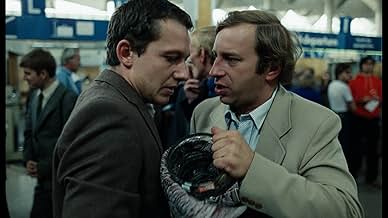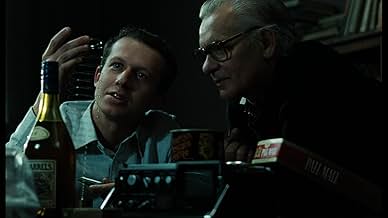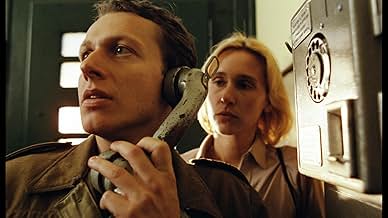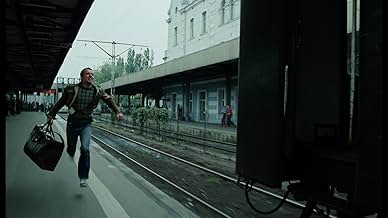Witek persigue a un tren. Se siguen tres variaciones de cómo un incidente tan aparentemente banal podría influir el resto de su vida.Witek persigue a un tren. Se siguen tres variaciones de cómo un incidente tan aparentemente banal podría influir el resto de su vida.Witek persigue a un tren. Se siguen tres variaciones de cómo un incidente tan aparentemente banal podría influir el resto de su vida.
- Premios
- 2 premios ganados en total
- mez Werki
- (sin créditos)
- dzialacz ZSMP
- (sin créditos)
- Buzek
- (sin créditos)
- Dirección
- Guionista
- Todo el elenco y el equipo
- Producción, taquilla y más en IMDbPro
Argumento
¿Sabías que…?
- TriviaAlthough the movie was made in 1981, it had its premiere in 1987. The delay was because of state-imposed censorship due to the film's political content.
- Citas
1. Werner: I intend to give you my current thoughts on an idea I've been committed to for 40 years. Every generation yearns for light. It needs reassurance and faith that the world can be better and a fairer place. This yearning which is older than Marx and younger than Marx, is like a drug. Early in life it brings joy, because the light seems so near and within reach. At life's end it brings bitterness, because the light has grown once again. In these 40 years I've lived through many things and the light seems further away than ever before, and thus I shouldn't encourage you, but you can be sure of one thing: without bitterness and this hope, life would be pitiful indeed.
- Versiones alternativasThe film was scheduled for release in 1981, but was suppressed by the Polish government due to its criticism of Communist regime. The film was eventually released in 1987 with some of the politically sensitive material cut (these cuts totalling roughly 9 minutes). The film has since been released in a uncut form, however one of the scenes involving Witek being beaten by the train guard remains lost.
- ConexionesFeatured in Arena: The Ten Commandments of Krzysztof Kieslowski (1990)
However, "Blind Chance" is, ultimately, a political film. Although Kieslowski never really considered himself a political film-maker (compared to some of his contemporaries), "Blind Chance" is very much driven by political undercurrents and the outcome of each scenario has a decidedly political aspect. That said, the film transcends the immediate political situation in Poland as well and elevates "politics" to a much broader all-encompassing level. It is really not Polish politics that concern Kieslowski here, but the human being's capacity for taking action. Each scenario presents a possible course of action (or non-action). Kieslowski doesn't seem to endorse one course over the other, but makes a much broader statement about the need to take action, to believe in something, and to fight for something. What one is fighting for, what one believes in, ultimately isn't as important as the fight itself.
A brilliant and highly thought-provoking film. In my opinion, one of Kieslowski's most accomplished and densely-packed works. I hope that anyone who didn't appreciate "Blind Chance" will give it another chance (I've watched it at least ten times). It is not the most accessible film, but the pay-off is worth the effort.
- robby_x
- 15 ago 2000
- Enlace permanente
Selecciones populares
- How long is Blind Chance?Con tecnología de Alexa
Detalles
Contribuir a esta página


































